2016-2017学年牛津译林版初中英语七年级下册全册知识点归纳总结
- 格式:doc
- 大小:451.18 KB
- 文档页数:32
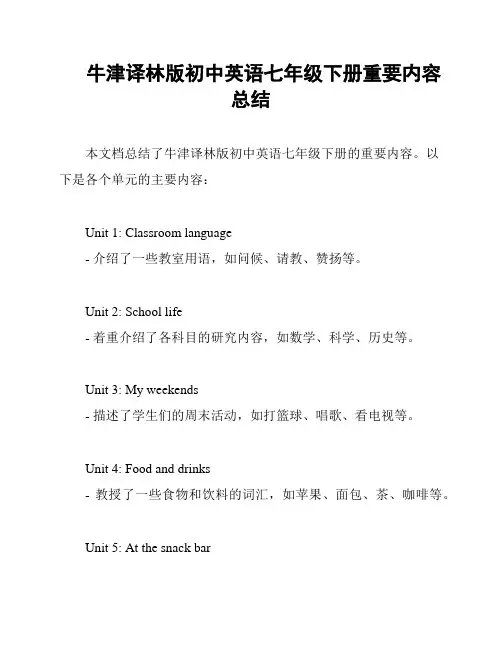
牛津译林版初中英语七年级下册重要内容
总结
本文档总结了牛津译林版初中英语七年级下册的重要内容。
以
下是各个单元的主要内容:
Unit 1: Classroom language
- 介绍了一些教室用语,如问候、请教、赞扬等。
Unit 2: School life
- 着重介绍了各科目的研究内容,如数学、科学、历史等。
Unit 3: My weekends
- 描述了学生们的周末活动,如打篮球、唱歌、看电视等。
Unit 4: Food and drinks
- 教授了一些食物和饮料的词汇,如苹果、面包、茶、咖啡等。
Unit 5: At the snack bar
- 研究了在小吃店点餐的常用句型,如“What would you like?”、“Here you are.”等。
Unit 6: Festivals and celebrations
- 介绍了一些重要的节日和庆祝活动,如春节、圣诞节、生日等。
Unit 7: Hobbies
- 研究了各种爱好和运动,如阅读、游泳、踢足球等。
Unit 8: At the zoo
- 通过描述动物的外貌和生活性,使学生了解不同的动物种类。
Unit 9: My body and health
- 关注了身体部位和健康问题,如头、肚子、感冒、发烧等。
Unit 10: My family
- 描述了家庭成员的关系和工作,如爸爸、妈妈、姐姐、弟弟等。
这些是牛津译林版初中英语七年级下册的重要内容总结。
希望能对您有所帮助!。
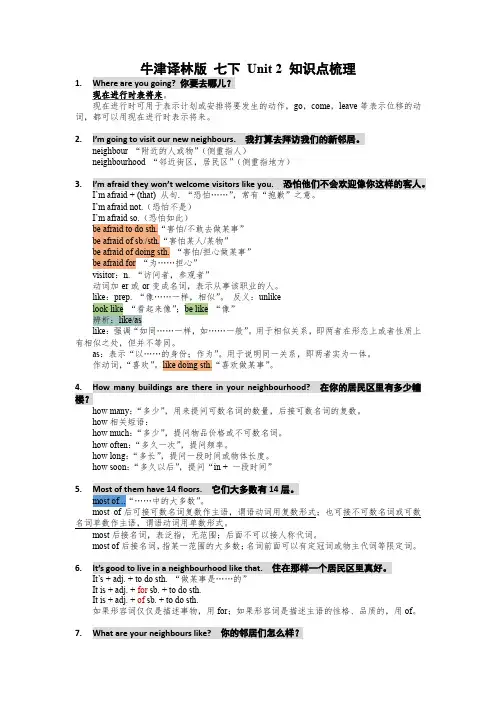
牛津译林版七下Unit 2 知识点梳理1.Where are you going?你要去哪儿?现在进行时表将来。
现在进行时可用于表示计划或安排将要发生的动作,go,come,leave等表示位移的动词,都可以用现在进行时表示将来。
2.I’m going to visit our new neighbours. 我打算去拜访我们的新邻居。
neighbour “附近的人或物”(侧重指人)neighbourhood “邻近街区,居民区”(侧重指地方)3.I’m afraid they won’t welcome visitors like you. 恐怕他们不会欢迎像你这样的客人。
I’m afraid + (that) 从句. “恐怕……”,常有“抱歉”之意。
I’m afraid not.(恐怕不是)I’m afraid so.(恐怕如此)be afraid to do sth.“害怕/不敢去做某事”be afraid of sb./sth.“害怕某人/某物”be afraid of doing sth. “害怕/担心做某事”be afraid for “为……担心”visitor:n. “访问者,参观者”动词加-er或-or变成名词,表示从事该职业的人。
like:prep. “像……一样,相似”。
反义:unlikelook like “看起来像”;be like “像”辨析:like/aslike:强调“如同……一样,如……一般”。
用于相似关系,即两者在形态上或者性质上有相似之处,但并不等同。
as:表示“以……的身份;作为”。
用于说明同一关系,即两者实为一体。
作动词,“喜欢”。
like doing sth.“喜欢做某事”。
4.How many buildings are there in your neighbourhood? 在你的居民区里有多少幢楼?how相关短语:how much:“多少”,提问物品价格或不可数名词。
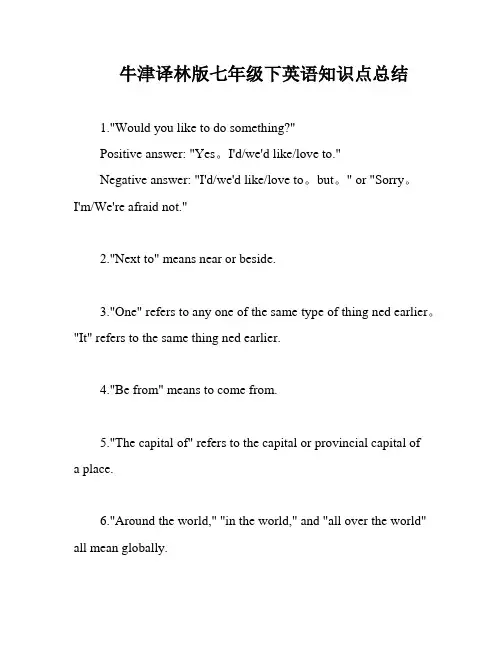
牛津译林版七年级下英语知识点总结1."Would you like to do something?"Positive answer: "Yes。
I'd/we'd like/love to."Negative answer: "I'd/we'd like/love to。
but。
" or "Sorry。
I'm/We're afraid not."2."Next to" means near or beside.3."One" refers to any one of the same type of thing ned earlier。
"It" refers to the same thing ned earlier.4."Be from" means to come from.5."The capital of" refers to the capital or provincial capital ofa place.6."Around the world," "in the world," and "all over the world" all mean globally.7."Enjoy oneself," "have a good time," and "have fun doing something" all mean to have a good experience doing something.8."In the centre of" means in the middle of.9."Share something with someone" means to use or enjoy something together.10."Look out" means to look outside。
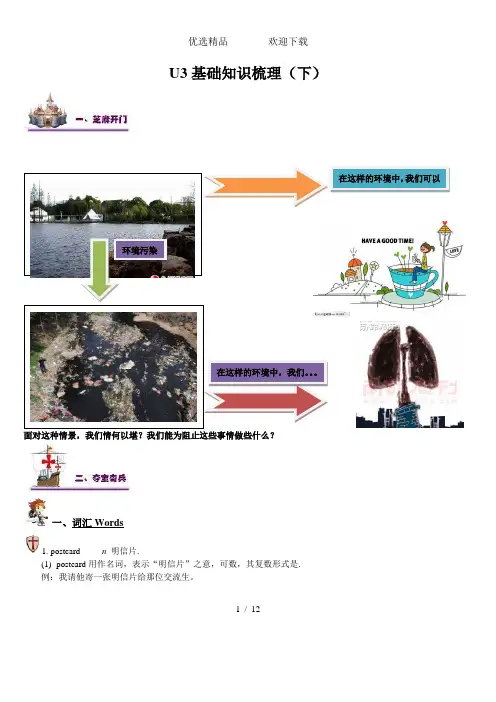
U3基础知识梳理(下)面对这种情景,我们情何以堪?我们能为阻止这些事情做些什么?一、词汇Words1. postcard n明信片.(1)postcard用作名词,表示“明信片”之意,可数,其复数形式是.例:我请他寄一张明信片给那位交流生。
在这样的环境中,我们可以环境污染在这样的环境中,我们。
1 / 122. key n 钥匙,答案,键,关键key用作名词,意为“钥匙;答案;关键”,其复数形式是。
(1)key表示“钥匙”之意时,常用“这个门的钥匙”固定搭配。
例:我没有前门的钥匙。
(2)key表示“答案”之意时,常用“这个问题答案”固定搭配。
例:我知道第一个问题的答案。
(3)key 表示“键”之意时,是指电脑、打字机、钢琴等“键盘上”的“键”。
例:这个键盘上有六排键。
(4)key 也可以用作名词,表示“关键”性的人或人事。
例:那个人可能是这个学校的关键人物。
3.ring n 环,圈;戒指(1)ring用作名词,表示“环;圈;戒指”,是可数名词,其复数形式是例:桌子上的指环不是我的。
(2)ring例:他经常星期天给我打电话。
4.all over 到处,遍及(1)all over 表示“到处”之意时,与副词everywhere 意义接近。
例:孩子们全身都湿透了。
(2)all over 表示“遍及”之意时,相当于介词throughout ,后面要接名词、代词等作宾语:“全世界”.例:全中国已经发生了巨大的变化。
全世界的儿童都喜欢看电视。
(all over)________________________________________________5.raise vt 饲养,使升高(1)raise ,及物动词,表示“饲养”,后接“饲养”的动物名称。
例:妈妈养了很多猪。
(2)raise ,及物动词,也可表示“使升高”,后接“使升高”的人、物等。
例:最后他提高了声音。
批注:[辨析] rise, raiserise(rose, risen)vi. 上升,升起, 升高;上涨;站起来。
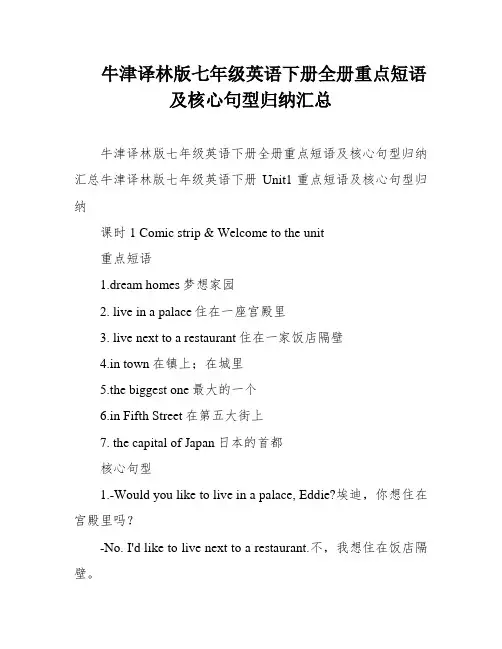
牛津译林版七年级英语下册全册重点短语及核心句型归纳汇总牛津译林版七年级英语下册全册重点短语及核心句型归纳汇总牛津译林版七年级英语下册Unit1重点短语及核心句型归纳课时1 Comic strip & Welcome to the unit重点短语1.dream homes梦想家园2. live in a palace住在一座宫殿里3. live next to a restaurant住在一家饭店隔壁4.in town在镇上;在城里5.the biggest one最大的一个6.in Fifth Street在第五大街上7. the capital of Japan日本的首都核心句型1.-Would you like to live in a palace, Eddie?埃迪,你想住在宫殿里吗?-No. I'd like to live next to a restaurant.不,我想住在饭店隔壁。
2.Which is your favourite?哪一个是你最喜欢的?3.-Is Tokyo the capital of Japan?东京是日本的都城吗?-Yes,it is.是的,它是。
课时2 Reading重点短语1.homes around the world天下各地的故里2. live in a town 15 miles from London住在离伦敦十五英里的一个镇上3.enjoy a cup of tea品(享受)一杯茶4. have fun with my dog there和我的狗一起在那儿玩得开心5.live in a flat in the centre of Moscow住在莫斯科市中央的一座公寓里6.on the seventh floor在八楼7.share a bedroom with my sister和我mm同住一间寝室8.listen to music in bed在床上听音乐9.have my own bedroom有我自己的卧室10.like the balcony best最喜欢阳台11.look out at the beach and the sea向外远望海滩和大海12. homes in different countries不同国家的家园13.the best place to chat and watch TV聊天和看电视最好的地方14.in most homes在大多半家庭里15.cook meals in the kitchen在厨房做饭16.share sth. with sb.与或人适用/分享某物17.dining room餐厅核心句型1.I live in a town 15 miles from London.我住在离伦敦十五英里的一个镇上。
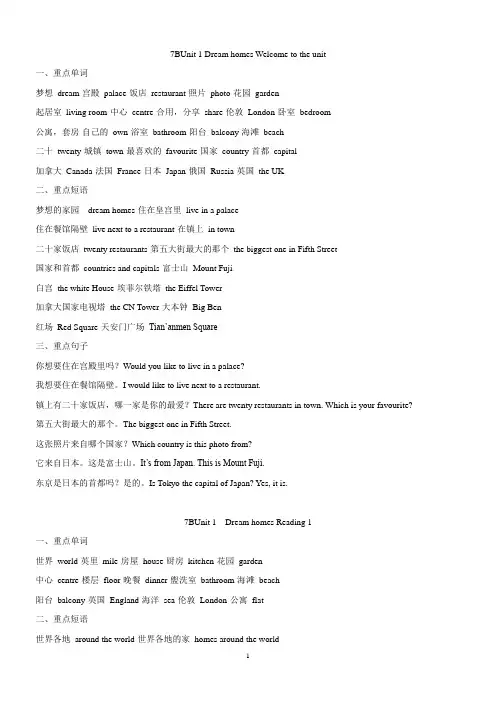
7BUnit 1 Dream homes Welcome to the unit一、重点单词梦想dream-宫殿palace-饭店restaurant-照片photo-花园garden起居室living room-中心centre-合用,分享share-伦敦London-卧室bedroom公寓,套房-自己的own-浴室bathroom-阳台balcony-海滩beach二十twenty-城镇town-最喜欢的favourite-国家country-首都capital加拿大Canada-法国France-日本Japan-俄国Russia-英国the UK二、重点短语梦想的家园dream homes-住在皇宫里live in a palace住在餐馆隔壁live next to a restaurant-在镇上in town二十家饭店twenty restaurants-第五大街最大的那个the biggest one in Fifth Street国家和首都countries and capitals-富士山Mount Fuji白宫the white House-埃菲尔铁塔the Eiffel Tower加拿大国家电视塔the CN Tower-大本钟Big Ben红场Red Square-天安门广场Tian’anmen Square三、重点句子你想要住在宫殿里吗?Would you like to live in a palace?我想要住在餐馆隔壁。
I would like to live next to a restaurant.镇上有二十家饭店,哪一家是你的最爱?There are twenty restaurants in town. Which is your favourite? 第五大街最大的那个。
The biggest one in Fifth Street.这张照片来自哪个国家?Which country is this photo from?它来自日本。
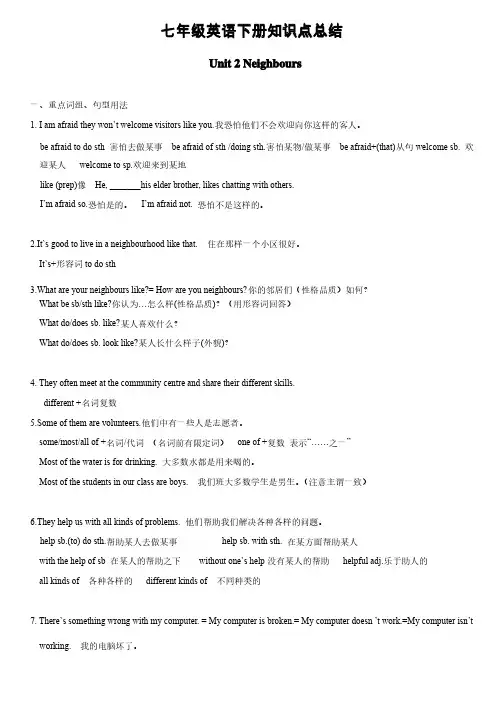
七年级英语下册知识点总结Unit 2 Neighbours一、重点词组、句型用法一、重点词组、句型用法1. I am afraid they won`t welcome visitors like you.我恐怕他们不会欢迎向你这样的客人。
我恐怕他们不会欢迎向你这样的客人。
be afraid to do sth 害怕去做某事害怕去做某事 be afraid of sth /doing sth.害怕某物/做某事做某事be afraid+(that)从句welcome sb. 欢迎某人迎某人 welcome to sp.欢迎来到某地欢迎来到某地like (prep)像He, _______his elder brother, likes chatting with others. I’m afraid so.恐怕是的。
恐怕是的。
I’m afraid not. 恐怕不是这样的。
恐怕不是这样的。
2.It`s good to live in a neighbourhood like that. 住在那样一个小区很好。
住在那样一个小区很好。
It`s+形容词to do sth3.What are your neighbours like?= How are you neighbours?你的邻居们(性格品质)如何?你的邻居们(性格品质)如何?What be sb/sth like?你认为…怎么样(性格品质)?(用形容词回答)?(用形容词回答)What do/does sb. like?某人喜欢什么?某人喜欢什么?What do/does sb. look like?某人长什么样子(外貌)?4. They often meet at the community centre and share their different skills.different +名词复数名词复数5.Some of them are volunteers.他们中有一些人是志愿者。
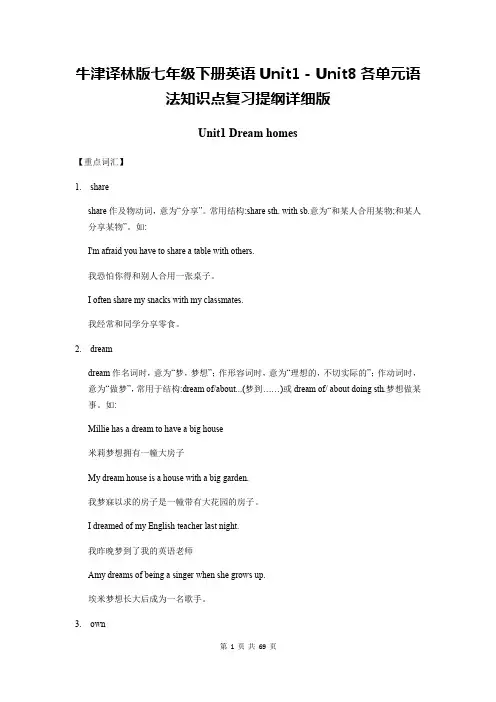
牛津译林版七年级下册英语Unit1-Unit8各单元语法知识点复习提纲详细版Unit1 Dream homes【重点词汇】1. shareshare作及物动词,意为“分享”。
常用结构:share sth. with sb.意为“和某人合用某物;和某人分享某物”。
如:I'm afraid you have to share a table with others.我恐怕你得和别人合用一张桌子。
I often share my snacks with my classmates.我经常和同学分享零食。
2. dreamdream作名词时,意为“梦,梦想”;作形容词时,意为“理想的,不切实际的”;作动词时,意为“做梦”,常用于结构:dream of/about...(梦到……)或dream of/ about doing sth.梦想做某事。
如:Millie has a dream to have a big house米莉梦想拥有一幢大房子My dream house is a house with a big garden.我梦寐以求的房子是一幢带有大花园的房子。
I dreamed of my English teacher last night.我昨晚梦到了我的英语老师Amy dreams of being a singer when she grows up.埃米梦想长大后成为一名歌手。
3. ownown作形容词.意为“自己的,属于自己的”,常和形容词性物主代词连用,构成短语of one's own,表示“属于某人自己的”,on one's own = alone,意为“独自地”。
own作动词时,表示“拥有”。
如:I have my own computer我有属于我自己的电脑。
That's a car of her own.那是她自己的汽车。
He lives on his own.他一个人生活。
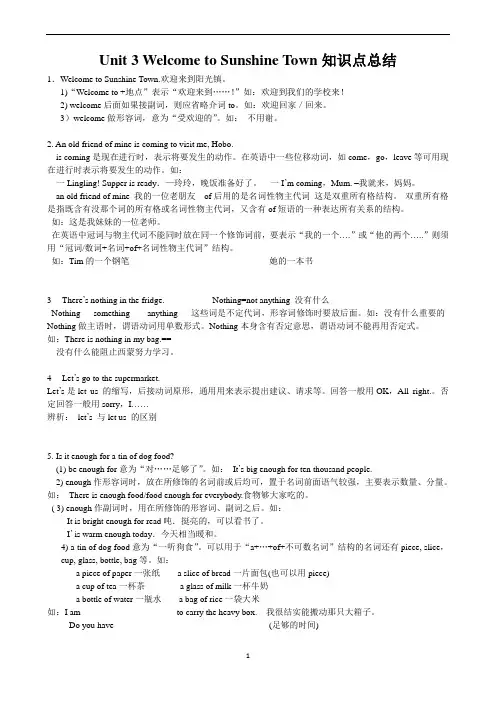
Unit 3 Welcome to Sunshine Town知识点总结1.Welcome to Sunshine Town.欢迎来到阳光镇。
1)“Welcome to +地点”表示“欢迎来到……!”如:欢迎到我们的学校来!2) welcome后面如果接副词,则应省略介词to。
如:欢迎回家/回来。
3)welcome做形容词,意为“受欢迎的”。
如:不用谢。
2. An old friend of mine is coming to visit me, Hobo.is coming是现在进行时,表示将要发生的动作。
在英语中一些位移动词,如come,go,leave等可用现在进行时表示将要发生的动作。
如:一Lingling! Supper is ready.—玲玲,晚饭准备好了。
一I’m coming,Mum. –我就来,妈妈。
an old friend of mine 我的一位老朋友of后用的是名词性物主代词这是双重所有格结构。
双重所有格是指既含有没那个词的所有格或名词性物主代词,又含有of短语的一种表达所有关系的结构。
如:这是我妹妹的一位老师。
在英语中冠词与物主代词不能同时放在同一个修饰词前,要表示“我的一个….”或“他的两个…..”则须用“冠词/数词+名词+of+名词性物主代词”结构。
如:Tim的一个钢笔她的一本书3There’s nothing in the fridge. Nothing=not anything 没有什么Nothing something anything 这些词是不定代词,形容词修饰时要放后面。
如:没有什么重要的Nothing做主语时,谓语动词用单数形式。
Nothing本身含有否定意思,谓语动词不能再用否定式。
如:There is nothing in my bag.==没有什么能阻止西蒙努力学习。
4Let’s go to the supermarket.Let’s是let us 的缩写,后接动词原形,通用用来表示提出建议、请求等。
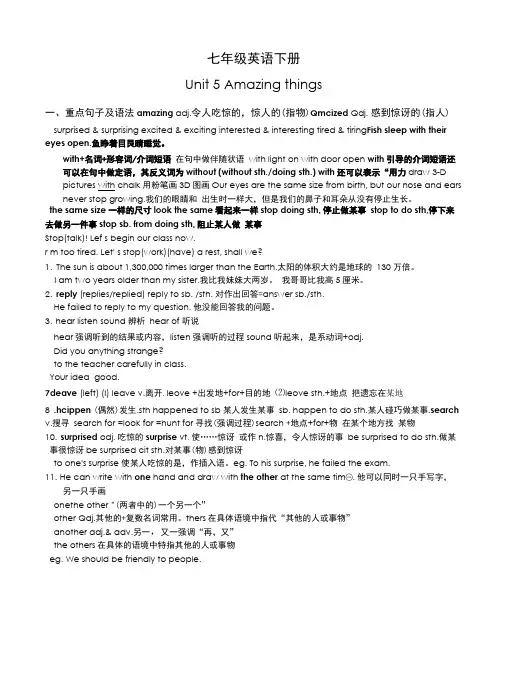
七年级英语下册Unit 5 Amazing things一、重点句子及语法amazing adj.令人吃惊的,惊人的(指物)Qmcized Qdj.感到惊讶的(指人)surprised & surprising excited & exciting interested & interesting tired & tiring Fish sleep with their eyes open.鱼睁着目艮睛睡觉。
with+名词+形容词/介词短语在句中做伴随状语with light on with door open with引导的介词短语还可以在句中做定语,其反义词为without (without sth./doing sth.) with还可以表示“用力draw 3-D pictures with chalk 用粉笔画3D图画Our eyes are the same size from birth, but our nose and ears never stop growing.我们的眼睛和出生时一样大,但是我们的鼻子和耳朵从没有停止生长。
the same size 一样的尺寸look the same看起来一样stop doing sth.停止做某事stop to do sth,停下来去做另一件事stop sb. from doing sth.阻止某人做某事Stop(talk)! Lef s begin our class now.r m too tired. Let' s stop(work)(have) a rest, shall we?1.The sun is about 1,300,000 times larger than the Earth.太阳的体积大约是地球的130 万倍。
I am two years older than my sister.我比我妹妹大两岁。
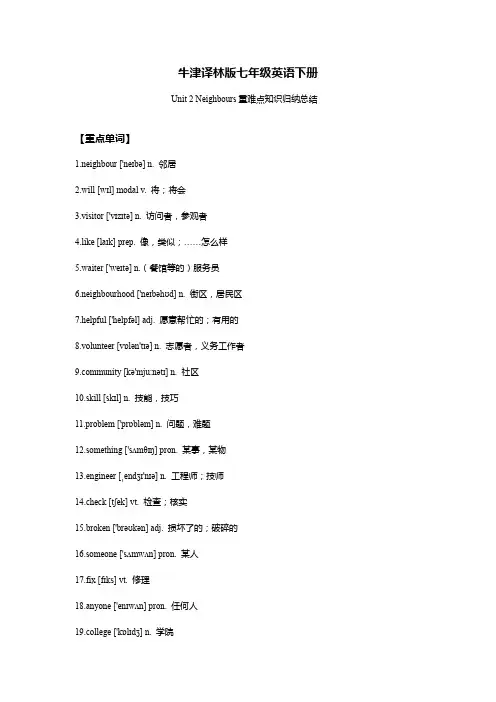
牛津译林版七年级英语下册Unit1知识点归纳<重要短语>1.live in a palace 住在一个宫殿里2.the capital of.. .的首都3. share sth. with sb.与某人合用/分享某物4.in size 在尺寸上5. be full of 满是6. some day 将来有一天,总有一天7. call sb. back 回电话8.next to 紧邻,在...近旁9. in the centre of 在...的中心10.look out at 向外眺望11.be different from 与...与众不同12. of one’s own 属于某人自己的13.take a message 传个话,捎个口信14.at the foot of 在...的脚下<重要句型>1.--Would you like to live in a palace, Eddie?埃迪,你想住宫殿吗?--No. I’d like to live ne xt to a restaurant.不。
我想住在饭店旁边。
2.Is Tokyo the capital of Japan ?东京是日本的首都吗?3.I always have fun with my dog there.我总是和我的狗在那里玩得很开心。
4.I share a bedroom with my sister.我和妹妹同住一间卧室。
5.I love to sit there and look out at the beach and the sea. 我喜欢坐在那儿,向外眺望海滩和大海。
6.Hello. May I speak to Daniel, please?您好。
我可以和丹尼尔通电话吗?7.--Who is speaking, please? 请问你是谁?--This is Simon. 我是西蒙。
译林版牛津英语七年级下册全册Unites1-8单元知识点及语法归纳一、重点词组、句型1、Would you like to live in the palace, Eddie? 埃迪,你想住宫殿里吗?①Would you like sth? 肯定答复: Yes, please. 否认答复: No, thanks.②Would you like to do sth? 肯定答复:Yes, I’d like/love to. 否认答复:I’d like/love to, but…2、There are twenty restaurants in town. 镇上有二十家餐馆。
There are about 8,000,000 people living in London. 大约有八百万人住在伦敦。
①表示某地有……,用there be 句型,谓语动词就近原那么。
There __________(be) an art room, a music room and two puter rooms in our school.②表示有事情要做,用there be sth to do。
Thereare lots of things ___________(see) in Beijing..③表示有某人正在做某事,用there be sb doingsth.。
On game shows, there are always famouspeople___________(talk) about their lives.3、I live in a town 15 miles from London. 我住在离伦敦15英里的一个镇上。
be far (away) from 离……远,但出现详细间隔时,不用farMy home is __________________from the school.My home is 5 kilometres ___________from the school.A. awayB. farC. closeD. next to4. have fun with sb./sth. 和某人/某物玩得开心have fun doing sth. 做某事很开心have(has/had) fun= have(has/had) a good time=enjo y(enjoyed) onself(myself/yourself/youselves……)5、I also have a bedroom of my own. =I also havemy own bedroom. 我也有自己的房间。
牛津译林版七年级英语下册Unit4词组知识点归纳一、词组或短语序号Chinese English1跟我来。
(2)follow me = come with me2在A和B之间between A and B3一定做某事/ 务必做某事be sure to do sth4对某事有把握be sure of sth5确信……be sure that + 从句6别害怕Don’t be afraid7不得不have / has to8不必要don’t / doesn’t have to9进行旅行/去旅行(2)go on a trip = have a trip10在……北面(不接壤)(2)be north of = be to the north of11在……北面(接壤)be on the north of12在……北面(被包含)be in the north of13我们到哪儿去进行班级旅行?Where are we going for our class trip?14三公里远three kilometers away15直走walk / go straight on16他们喜欢吃竹子并整天躺着。
They like to eat bamboo and lie down all day long. 17许多游客来这儿看他们。
Many visitors come here to see them.18沿着这条路走walk along the road19记住他们是危险的。
Remember that they are dangerous.20不要靠近他们。
Never go near them.21向左转/ 向右转turn left / turn right22鸟儿唱歌时发出优美的声音。
Birds make beautiful sound s when they sing.23他们上蹿下跳惹得人们大笑。
They jump around and make people laugh.24使某人做某事make sb do sth25他们的长脖子帮助他们吃到树上的Their long necks help them eat the leaves fromthe trees.26在鸟的世界的北面是猴子的森To the north of the World of Birds is theMonkeys’ forest.27过桥(2)cross the bridge = go across the bridge28过了桥,你将会看到大象。
7B Unit1 Grammar一、知识点总结要点一:1,815 feet tall(1)foot名词“英尺”,“脚,足”,复数形式feet。
The mountain is about 3,500 feet high. 这座山大约3500英尺高。
A dog has four feet.狗有4只脚。
(2)“sth.+be+数词+表单位的词+形容词(长、宽、高、深等)”表示“某物……长/宽/高/深等”。
1,815 feet tall意为“1815英尺高”。
The bridge is 10 meters wide and 50 meters long.这座桥10米宽、50米长。
要点二:square①可数名词“广场”。
There is a large square in our city. 在我们城市有一个大广场。
Tian' an men Square is in Beijing. 天安门广场在北京。
②形容词“平方的”。
The room is 200 square meters. 这个房间有200平方米。
③形容词“正方形的”The window is square. 这扇窗子是正方形的。
要点三:have an area of“占……面积”=in sizeThe country has an area of 600,000 square kilometres.=The country is 600,000 square kilometers in size. 这个国家的面积为60万平方千米。
要点四:over 介词“超过”=more than。
My father is over forty.我父亲40多岁了。
一How many books do you have?你有多少本书?一Over ten. 10多本。
要点五:“在某处有某人或某物正在做……”There is a/an+单数可数名词+v-ing+地点状语There are+可数名词复数+v.-ing+地点状语。
mine pron.(名词性物主代词)我的n. 矿,矿井pron. (主格) I(形容词性物主代词)my (反身代词)myself◆我自己;我本人▲名词性物主代词= 形容词性物主代词my+名词”。
注意:在英语中,不定冠词与形容词性物主代词不能同时修饰一个名词。
▲a/an+名词+of+名词性物主代词/名词所有格某人的一个……◆a book of hers 她的一本书◆a pen of Jim's吉姆的一支钢笔◆a book of my mother's 我母亲的一本书pron.没有什么▲①nothing 为否定意义的不定代词,常跟形容词或动词不定式作后置定语。
◆nothing =not...anything ◆nothing wrong 没有什么毛病▲②复合不定代词作主语时,谓语动词用单数形式类似于nothing的复合不定代词有:▲①something,somebody,someone(常用于肯定句);▲②anything,,anybody,anyone(常用于否定句或疑问句);▲③ everything,everybody,,everyone等adj. 足够的▲①enough + 复数▲②enough + ◆enough space for sb. to move 足够的空间供某人活动▲③be... enough for 对......来说足够......了▲④be... enough to do sth. 足够......可以做某事enough adv.足够地,充分地▲adj./adv. + enough to do sth. 足够...来做某事a tin of…= one tin of…一罐……▲①可以用于“a+量词+of+不可数名词”结构的量词:还有piece,slice,cup,glass ,bottle,bag等。
▲②不可数名词表示具体数量时要借助量词。
◆a piece of paper 一张纸◆two pieces of paper 两张纸◆a slice /piece of bread 一片面包◆a cup of tea 一杯茶◆four cups of tea 四杯茶◆a glass of milk 一杯牛奶▲① order vt. &vi.点(菜);订购◆order sb. sth.= order sth. for sb. 为某人点(菜、饭);为某人订购某物◆order a new dress 订购一条新连衣裙◆order a bowl of noodles 点一碗面条▲② order vt. 命令;n. 顺序,次序◆order sb.to do sth. 命令某人做某事◆order sb. not to do sth. 命令某人不要做某事与order相关的短语及句型:◆in order 整齐,按顺序◆in good order 整齐,有条不紊★Everything is in order. 一切准备就绪。
2016-2017学年牛津译林版初中英语七年级下册全册知识点归纳总结Unit 1 Dream homes一、重点词汇国家->首都->语言->1、Would you like to live in a palace, Eddie? 艾迪,你想住在宫殿里吗?这里would like 是“想,想要”的意思,后面可以加名词或动词或动词不定式。
如:I’d like to go to the USA next year. 明年我想去美国。
2、I’d like to live next to a restaurant. 我想住在餐馆附近。
这里next to 是“附近,靠近的”的意思,相当于near。
如:The table is next to the window. 这张桌子在窗户旁。
3、Which country is this photo from, Amy? 艾米,这幅照片来自哪个国家?这里be from 相当于come from, 是“来自……”的意思。
如:Where is Mr Black from? 布莱克先生来自于哪儿?4、Is Tokyo the capital of Japan? 东京是日本的首都吗?句型结构为:The capital of +国家is +首都。
如:The capital of the UK is London. 英国首都是伦敦。
[拓展](1)capital n. 省会The capital of Jiangsu is Nanjing. 江苏省会是南京。
(2)capital n. 大写字母We should write in a capital at the beginning of a sentence. 句子的开头我们应该用大写字母。
(3)capital n. 资本,资金,资产personal capital 个人资产(4)capital adj. 顶好的,一流的He came up with a capital idea. 他想好一个绝妙的主意。
5、I like the kitchen best. 我最喜欢厨房。
Like…best 意为“最喜欢……”,相当于like…most。
如:The girl likes playing the piano best/most. 这个女孩最喜欢弹钢琴。
What activity do you like best/most? 你喜欢什么活动?6、I share a bedroom with my sister. 我和姐姐共用一个卧室。
这里share 的意思是“共同使用,共同分享”,通常用于以下结构:share sth with sb 表示“和某人共享某物”。
如:I share the computer with my brother. 我和我弟弟共用一台电脑。
7、I have my own bedroom and bathroom. 我有我自己的卧室和浴室。
own 在这里用作形容词,意为“自己的”,必须与物主代词连用。
如:Now ask the same questions about your own teacher.用同样的问题问一些关于你们老师的情况。
This book is my own. 这本书是我自己的。
[拓展]own 用作动词时,意为“所有;拥有”。
如:Which of these would you most like to own? 这些东西,你最想拥有哪一个?We don’t own our flat—we rent it. 我们自己没有房子——这是租的。
(1)of one’s own 自己做的;自己独有的He has a room of his own. 他有自己专用的房间。
(2)on one’s own 单独,独自I’ve b een living on my own for four years now. 我已单独一人生活了四年了。
You can’t expect him to do it all on his own. 你不能期望他独自一人做它。
8、France has an area of over 260,000 square miles.法国有超过260,000平方英里的面积。
(1)这里over意为“多于,超过”,相当于more than。
如:The whale can stay under the water for over a half hour but then it must come to the top for air.鲸鱼能在水下停留半个小时,然后必须到水面上来吸气。
According to his count, there were over 3,000 people at the meeting.按照他的计算,有3,000多人出席了会议。
(2)have an area of 意为“有……面积”如:The town covers an area of ten square kilometers. 这个城镇的面积有10平方公里。
9、Hello. May I speak to Daniel, please? 喂。
请问我可以和丹尼尔通话吗?Hello. May/Can I speak to …, please? 是英语中打电话时常用的开场白,意为“请问,我能找某人接电话吗?”如果对方就是你要找的那个人,他/她通常会说Speaking.(我就是。
)如:-Hello! May/Could I speak to Mr Green, please? -你好!我能找格林先生接电话吗?-Speaking./This is Mr Green speaking./Mr Green speaking. -我就是。
注意:用英语打电话时,询问对方是谁,不用Who are you? 而常用Who’s that?或者Who’s the (speaking?)(你是谁?),还可以说Is that…?(你是……吗?)。
当需要自我介绍时可以说This is …(speaking).或者My name is …。
10、There is a football field in front of my house and a swimming pool beside it.在我家房子的前面有一个足球场,在它的旁边的一个游泳池。
本句型是“There be +名词+介词短语”,意为“在某地有什么”,其中的be 必须与后面的名词在数上保持一致。
如:There is an MP3 on the desk. 桌子上有一只MP3。
There are two MP3s on the desk. 桌子上有二只MP3。
三、核心语法基数词和序数词英语中的数词分为基数词和序数词两类。
表示数目的词是基数;表示数目顺序的词是序数词。
基数词的构成10 ten 25 twenty-five 123 one hundred and twenty-three11 eleven 26 twenty-six 1,000 one thousand12 twelve 27 twenty-seven 1,001 one thousand and one13 thirteen 28 twenty-eight 2,235 one thousand, two hundred andthirty-five14 fourteen 29 twenty-nine15 fifteen 30 thirty注意:(1)21~99之间的各数词,在十位数和个位数之间加连字符“-”。
(2)101~999之间的数词,在百位数hundred后应加and 。
教你巧学巧记(巧记100内的基数词)基数词不难记,整十之后有-ty,找清规律容易,要说“几十几”,二十以内词各异,中间“-”号莫忘记。
十三到十九相同,后加-teen莫忘记。
Hundred是“一百”,请你记住莫大意。
二十、三十……至九十。
读数的诀窍有一首歌诀,可以帮助我们迅速地用英语读出长数字。
从右向左三逗开,一逗千,二逗万,三逗就是十万万;左右三位分开读,保你又快又喜欢。
1、“从右向左三逗开,”指从右向左把长数字每三位用逗号分开。
如:10,234;225,689;61,564,0232、“一逗千,二逗百万,三逗就是十万万;”指从右向左的第一个逗号表示“千”(thousand);第二个逗号表示“百万”(million);第三个逗号表示“十万万”(billion,即十亿)。
3、“左右三位分开读,保你又快又喜欢”指读数时从左向右,每三位三位地按三位数的读法去读,遇到逗号时就分别加上该逗号所表示的哪个单词。
如:327;读作:three hundred and twenty-seven508;读作:five hundred and eight60,808;读作:sixty thousand, eight hundred and eight1,234,567;读作:one million, two hundred and twenty-four thousand, five hundred and sixty-seven 13,000,000,000;读作:thirteen billion基数词的用法1、在句子中的主要作用:(1)作主语Two of then joined the army last year. 去年他们当中有两人参了军。
(2)作宾语Give her one, please. 请给她一个。
(3)作定语There are forty-eight students in their class. 他们班有四十八位学生。
(4)作表语She is only thirteen. 她只有十三岁。
2、基数词也可以表示顺序和编号,通常用数字表示,放在“房间”、“页”、“章”或“电话号码”等名词后面。
如:Room 406:读作:room four 0[] six 第406房间Page 40:读作:page forty 第四十页编号时,也可用序数词表示,如:the first lesson=Lesson One。
序数词的构成序数词表示“次序”,用途广泛。
基数词变为序数词绝大多数是直接加-th,也有少数变化是不规则的。
虽然不规则的少,但同学们却最容易弄错。
如把twelfth写成twelvety,把ninth写成nineth。
记住下面的口诀可以帮助我们克服诸如此类的错误:一二三,特别记(1)其余后加-th。
八减t(2),九去e(3),f要将ve替(4)。
Y变为ie,然后再加-th(5)。
“几十几”面前要注意,个位序数要牢记(6)。